Prøve GULL - Gratis
Women on the Rise
Cobblestone American History Magazine for Kids
|April 2017
The activism of women was impossible to miss during the Progressive Era. From labor strikes and grassroots campaigns to the crusade for the vote, women mobilized in large numbers.

In the New York City garment industry, tens of thousands of Jewish and Italian immigrant women labored in crowded and often dangerous factories and sweatshops. A number of small strikes broke out in October 1909. One young strike leader—Clara Lemlich—made history. She had been advised by male labor leaders to proceed cautiously. Instead, at a mass meeting the following month, she turned the struggle into something much larger. “I am a working girl, one of those who are on strike against intolerable conditions,” she declared, “I offer a resolution that a general strike be declared—now!” The crowd went wild, and a general strike of women garment workers began. From November 1909 to February 1910, between 20,000 and 40,000 women—many of them teenagers—struck their employers. They demanded higher wages, shorter working hours, paid overtime, and union recognition.
Members of the local branch of the International Ladies’ Garment Workers’ Union Local 25 gathered in mass meetings in the evening and marched in picket lines during the day. Their protest was difficult and dangerous. Employers hired thugs and private security guards to harass and beat the strikers. Police often arrested picketers. One account put the number of arrests in the strike’s first month at 771 people.
Law enforcers attacked the strikers’ supporters as well. The Women’s Trade Union League had been formed in 1903 to promote women’s unionization. Middle-class and elite women dominated its membership. When they joined the picket lines in a show of support for working women, their privileged backgrounds didn’t protect them from abuse and arrest. The violence directed against the women strikers and their allies attracted considerable attention in the press.
In the end, arbitration
Denne historien er fra April 2017-utgaven av Cobblestone American History Magazine for Kids.
Abonner på Magzter GOLD for å få tilgang til tusenvis av kuraterte premiumhistorier og over 9000 magasiner og aviser.
Allerede abonnent? Logg på
FLERE HISTORIER FRA Cobblestone American History Magazine for Kids
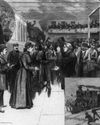
Cobblestone American History Magazine for Kids
nellie Bly Journalist
nellie Bly's first newspaper articles appeared in print when she was just 20 years old.
2 mins
Cobblestone February 2025: Women Trailblazers of the 1800s
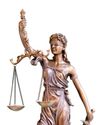
Cobblestone American History Magazine for Kids
Arabella Mansfield -Lawyer
Arabella Mansfield started out life as Belle Babb (1846-1911). She grew up in a Midwest family that valued education. In 1850, her father left to search for gold in California. He died in a tunnel accident a few years later.
2 mins
Cobblestone February 2025: Women Trailblazers of the 1800s
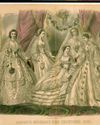
Cobblestone American History Magazine for Kids
Sarah Josepha Hale Editor
Long before Vogue or Glamour caught women's attention, Godey's Lady's Book introduced the latest fashions.
3 mins
Cobblestone February 2025: Women Trailblazers of the 1800s

Cobblestone American History Magazine for Kids
Louise Blanchard Bethune - Architect
Louise Blanchard Bethune (1856-1915) showed early promise in math. Lucky for her, her father was the principal and a mathematics teacher in a school in Waterloo, New York. Instead of going to school, Louise's father taught her at home until she was 11 years old. She also discovered a skill for planning houses. It developed into a lifelong interest in architecture and a place in history as the first professional female architect in the United States.
2 mins
Cobblestone February 2025: Women Trailblazers of the 1800s
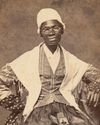
Cobblestone American History Magazine for Kids
Sojourner Truth Speaker
There was a time when slavery wastes abolished the institution over a number of decades. New York abolished slavery in 1827. Isabella Baumfree (c. 1797-1883) was born enslaved in Hurley, New York. When she was nine, she was taken from her parents and sold. She then was sold several more times. Some of her owners were cruel and abused her. During that time, she had several children.
1 mins
Cobblestone February 2025: Women Trailblazers of the 1800s
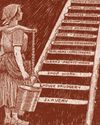
Cobblestone American History Magazine for Kids
Getting Started
In this editorial cartoon, a young 19th-century woman must overcome the obstacle of carrying a heavy burden while climbing a multirung ladder before she can achieve \"Equal Suffrage.\"
2 mins
Cobblestone February 2025: Women Trailblazers of the 1800s
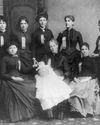
Cobblestone American History Magazine for Kids
Leonora M. Barry - Investigator
When Leonora M. Barry (1849-1923) was a young girl, her family left Ireland to escape a famine. They settled in New York. Barry became a teacher. In 1872, she married a fellow Irish immigrant. At that time, married women were not allowed to work. So, Barry stayed home to raise their three children.
2 mins
Cobblestone February 2025: Women Trailblazers of the 1800s

Cobblestone American History Magazine for Kids
Finding a New Path
For many Americans, this month's mystery hero represents the ultimate modern trailblazer. She is recognized by just her first name.
1 min
Cobblestone February 2025: Women Trailblazers of the 1800s
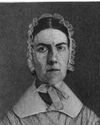
Cobblestone American History Magazine for Kids
The Grimké Sisters Abolitionists
Every night, Dinah was supposed to brush the E hair of her mistress, Sarah Moore Grimké (1792-1873). But one night, 12-year-old Sarah stopped Dinah. She wanted to help Dinah instead. They had to be quiet so they wouldn't get caught. It was 1804 in Charleston, South Carolina. The Grimkés were among Charleston's major slaveholding families. Strict laws regulated the behavior of both master and enslaved people.
4 mins
Cobblestone February 2025: Women Trailblazers of the 1800s
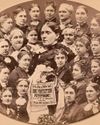
Cobblestone American History Magazine for Kids
Frances Willard Leader
During Frances Willard's lifetime (1839-1898), she was the best-known woman in America: She headed the largest women's organization in the worldthe Woman's Christian Temperance Union (WCTU). In that role, her abilities shone as a social activist, a dynamic speaker, and a brilliant organizer. She educated women on how to run meetings, write petitions, give speeches, and lobby state and federal legislators.
2 mins
Cobblestone February 2025: Women Trailblazers of the 1800s
Translate
Change font size
